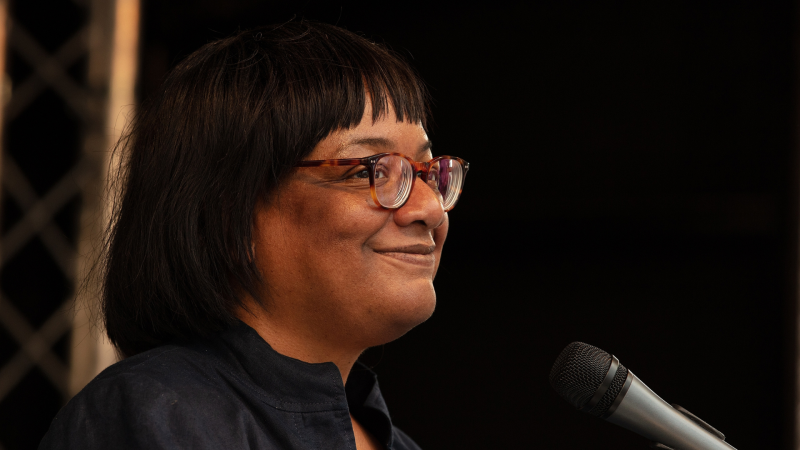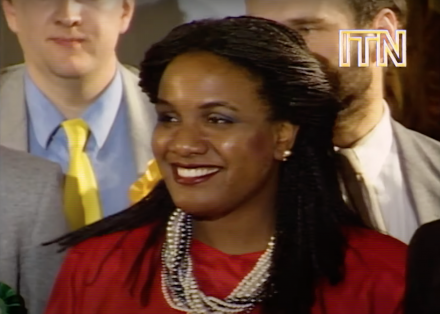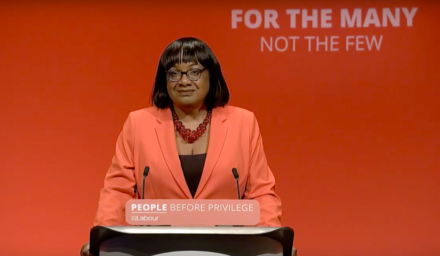
Diane Abbott’s A Woman Like Me starts with a picture of the author as a toddler alongside her family. She is striding forward and pointing a finger in the air, and, the older Abbott tells us, “nobody in that photograph looks more self-assured than the smiling Diane Abbott, not yet 2 years old”. This self-assurance is perhaps the defining trait of the woman who was elected in 1987 as the first Black woman MP and, after 37 years in parliament, is now the Mother of the House.
While most will likely be reading for the political insight (and acid asides) of the later sections, to me the stronger sections of Abbott’s memoir are those that cover her life before she entered Parliament. They peer into her often tumultuous family life, the broader West Indian community in London in the 1950s and 60s, Abbott’s time as a student at Cambridge, and her varied and interesting career in the civil service, politics and TV journalism.
A compelling portrait of family life
Born to Jamaican parents in Paddington in 1953 (an area she would later represent as a Westminster councillor between 1982 and 1986), Abbott spent her early childhood in central London before the family moved out to Harrow, where at school she was among a vanishingly small number of Black pupils. Her father was a factory worker and her mother a nurse who became, upon the birth of Abbott and her younger brother, a full-time housewife. This was not her preference but, rather, her husband’s. Reginald Nathaniel Abbott was domineering and controlling: so much so that Abbott’s parents’ marriage broke down when she was a teenager, with her mother moving to Yorkshire and starting to work again as a nurse.
Abbott’s memoir’s treatment of her father is compelling and considered: she talks candidly about how he tyrannised her mother and how for many years Abbott resented him for it, but also weighs up what she owes him (it was his decision that she was to stay in Britain rather than be sent to relatives in Jamaica) and the toll crushing discrimination took on a proud man living a difficult life. It’s a complicated portrait, and one full of painful incidences (his driving away from Abbott’s university graduation, taking all his daughter’s books, is particularly difficult to read).
- READ MORE: Jon Trickett: ‘Labour must not fail to seize the moment with its fresh landslide majority
Home Office an “emphatically anti-civil liberties organisation”
Winning a place at Cambridge despite the doubts of her teachers, Abbott studies history and upon graduation becomes a civil service graduate trainee in the Home Office. In her interview, she tells the panel that she wants to be a civil servant “because I want power”. Despite praise for then-Home Secretary Roy Jenkins (“forceful and reforming”), she comes to view the Home Office as an “emphatically anti-civil liberties organisation”.
During this time she began to move further towards politics, joining the Labour Party (she went to her first party conference in 1978 – “I loved it”) and eventually departing to take up a job at the National Council for Civil Liberties (now Liberty) as its first-ever race relations officer. Her colleagues there included Patrica Hewitt (of whom Abbott’s review is somewhat mixed) and Harriet Harman (who comes across well throughout the book, with Abbott terming her “the type of feminist who would always reach out to other women in difficulty”).
Her time at the NCCL was relatively short-lived, as (on the advice of a married TV executive with whom she was having an affair, one of the more risqué details the memoir provides) she decides to become a television researcher and greatly enjoys it, spending some years as a broadcast producer across several companies.
In search of a parliamentary seat
Upon coming into the party, Abbott encounters the set of London-based leftists profiled by Andy Beckett in his recent book The Searchers – Corbyn, McDonnell, Livingstone, Benn, along with future Tottenham MP Bernie Grant – remarking that “I do not think any of us realised how often our paths would cross in the decades to come”.

From the mid-80s, she began looking in earnest for a parliamentary seat, against what she describes as “visceral” opposition at the top of the party to the selection of Black MPs. After a few tilts (including one in Brent against Ken Livingstone that she clearly considers misjudged; he “never really forgave” it) she pulled off a shock victory in the Hackney North selection against the sitting MP and became Labour’s candidate, although she reports receiving very little support from the national party. She was elected at the 1987 general election, one of four ethnic minority MPs (all Labour) who came into Parliament then.
In some ways, what I’ve outlined is a fairly typical politician’s pre-parliamentary career: Oxbridge, civil service, third sector, journalism, MP by her mid-30s. But Diane Abbott is not a typical politician, and one of the things that comes across most strongly is how totally alone she was in so much of her career, as the only Black woman and likely the only Black person in many, many rooms. In Andy Beckett’s recent account, supreme self-possession is what sets Abbott apart (she also, he argues, can be prone to stubbornness): her memoir would tend to reinforce this view. Plenty of people are, as Abbott is, clever and passionate about politics, but even among politicians such unwavering self-belief is rare.
Abbott the “eternal optimist”
If this makes her sound dour and imperious, it’s pleasing to report that in A Woman Like Me Abbott manages something quite rare for politicians, and comes across as sounding quite fun: someone who likes a good time (the generous media expense accounts of the 80s weren’t wasted on her), has a wide circle of friends and sincere cultural interests outside of politics (It is this wider interest that did, in part, for Abbott’s fairly short-lived relationship with Corbyn, who she says cares “99%” about party politics, with some small room left for concern over vegetable growing).
The book is also surprisingly romantically candid, detailing snippets of various relationships and dishing out occasional bits of dating advice (you shouldn’t marry the first person you sleep with; being a woman MP doesn’t mix well with dating). “I remain the eternal optimist and still think Prince Charming may be around the corner”, she endearingly notes.
Rebellion, campaigning, and a leadership bid
In Parliament, as outside, Abbott reports finding little support from Labour’s leadership, who she describes as “embarrassed” by their Black MPs. Abbott and her colleagues set up a Black parliamentary caucus, modelled on the powerful American Black Congressional Caucus, but it did not last; she served on the Treasury select committee and began to campaign on racism and education. Under New Labour, Abbott frequently rebelled (including over Iraq), but also built her profile through regular media appearances and in 2010 she ran to be leader of the party, coming last in the overall electoral college but third amongst ordinary members.
Her descriptions of the Miliband brothers are extremely funny; she reports that, when the candidates were told the results in private, David Miliband was shocked. “But I have written my speech!” was, apparently, his response. Abbott was a shadow minister under his victorious brother for some years, before being sacked. “Being Ed”, she writes, “he tried to do it in a nice way, saying in a conciliatory manner, “I do not want us to keep falling out”. Then he added, “I hope you think I am doing the right thing”.
The shadow cabinet under Corbyn
 When her long-time ally Corbyn became leader in 2015, Abbott became shadow international development secretary and then Shadow Home Secretary (given where she started her career, this is clearly particularly important to her, and she talks very sincerely of how her ambition was to be the first Black Home Secretary), but still describes being somewhat apart and at odds with the top of the party (she was “stood down” in the 2017 campaign).
When her long-time ally Corbyn became leader in 2015, Abbott became shadow international development secretary and then Shadow Home Secretary (given where she started her career, this is clearly particularly important to her, and she talks very sincerely of how her ambition was to be the first Black Home Secretary), but still describes being somewhat apart and at odds with the top of the party (she was “stood down” in the 2017 campaign).
After 30 years in parliament (and with some health problems from diabetes), she considered standing down in 2017, but ultimately decided against. With an increased profile and the rise of social media, Abbott becomes subject to an increasingly intense torrent of online abuse (“if you had told me before I got into parliament that I would read the word “n****r” so much I would not have believed you”, she reports one of her staff telling her), which clearly takes a toll on her; the book has already been outpaced by events (it doesn’t cover her recent fight to stay a Labour candidate), but it does describe the racist comments made about Abbott by Tory donor Frank Hester, which left her genuinely shaken and feeling as though “I had a target on my back”.
It is unsurprising to learn that Diane Abbott does not think much of Keir Starmer. Of his leadership bid she scoffs that “you would have believed that he had been involved in every major industrial dispute since the 1980s”. She describes her now-infamous letter to the Observer as “ill-judged” and a poor reflection of her thoughts, but then goes on to allege that she was not allowed to make a statement or explain herself through official channels, believing that there was a desire to get rid of her as “mine was the biggest scalp they could win after Jeremy”. After a period as an independent and an almighty struggle at the start of the general election campaign (not covered here), Abbott, of course, remains an MP, and A Woman Like Me offers a readable and likeable guide to the life and politics of an iconic Labour figure.




More from LabourList
Almost half of Labour members oppose plans to restrict jury trials, poll finds
‘How Labour can finally fix Britain’s 5G problem’
‘The University of the Air – celebrating 60 years of Harold Wilson and Jennie Lee’s vision’